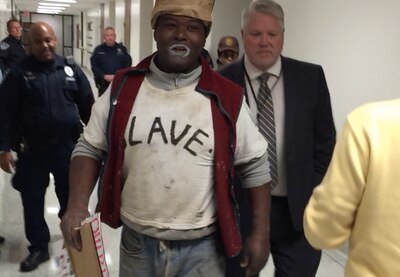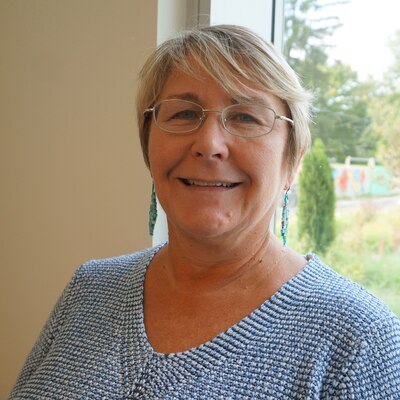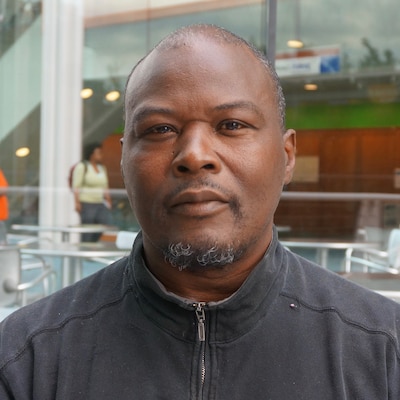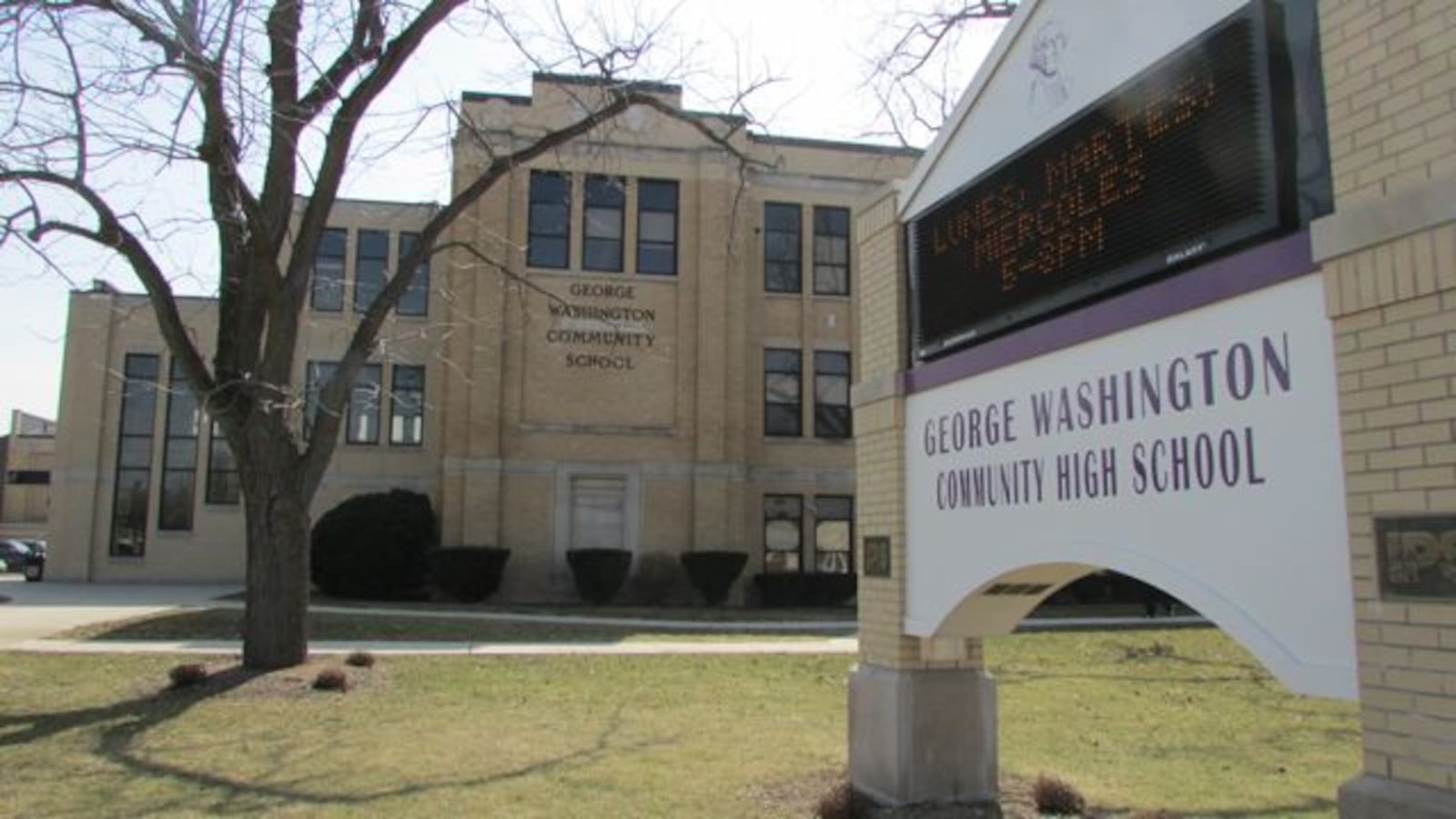(This is the third in a series of stories profiling the 10 candidates for Indianapolis Public Schools Board and their positions on some of the most substantive issues facing the district. In the coming weeks Chalkbeat will profile the candidates for each of the seats up for election. Today we cover District Four, where incumbent Diane Arnold is facing a challenge from Larry Vaughn to represent the southwest side of the district, which includes George Washington High School.
For more coverage of the campaign for school board and the state political candidates check out the Chalkbeat election series.)
In the contentious battle for control of Indianapolis Public Schools Board this election, the race for one seat has taken an especially unusual shape.
On one side is Diane Arnold, a longtime board member who has run the Hawthorne Community Center for decades and has deep roots on the west side.

On the other is Larry Vaughn, a gadfly who has made multiple longshot bids for public office, and who has delivered public tirades accusing board members of perpetuating slavery and child molestation.
More conventional critics of the school board’s direction are so eager to unseat current members that they have looked past Vaughn’s incendiary language to support his candidacy. Concerned Clergy and a new group called OurIPS endorsed him last month.
Chrissy Smith, a member of OurIPS with two children at Sidener Academy, voted for Arnold in the past two board elections. But she said she is now so disappointed by Arnold’s support for innovation schools and other new policies that she is putting aside some reservations to vote for Vaughn, whom she described as extremely knowledgable.
“The only other person that’s running in my district is Larry Vaughn,” she said. “Just because someone may have some different ways of presenting things or has been controversial doesn’t mean that they won’t be able to adequately perform the duties of the office.”

Diane Arnold runs the Hawthorne Center, which serves children and families in her near west side neighborhood, and she is the longest-serving member of the board. She won her spot in 2004, and has remained as the board went through a transformation. She is now part of a majority that largely favors pro-reform policies and cooperation with charter schools.
Arnold grew up on the west side and graduated from George Washington High School, where she met her husband. Her two children went to IPS elementary schools but left for high school, attending Speedway and Cardinal Ritter high schools. At the time, George Washington and many of the west side IPS schools were closed, leaving a painful fissure in the community, Arnold said.
At the Hawthorne Center, Arnold works with many children in the community as well as parents who are struggling to take care of their families. When children disconnect from education, they often return to the center years later for help making ends meet, she said.
“I do believe that education is the key to breaking the cycle of poverty,” she said. “I see children who come from environments fraught with so many barriers, poverty and domestic violence, and to see them achieve academically — I’ve had children who have come from horrific situations and they’ve gone on to be valedictorians.”
Arnold said she is proud of the work the board has done recently, including giving raises to teachers, significantly reducing the number of schools that the state considers failing, and trying new approaches to fixing failing schools.
“We’re making progress,” she said.

Larry Vaughn, an artist and frequent protester, is Arnold’s only challenger to represent the south west side. Although Vaughn has tempered his speech slightly during the campaign, his speeches at public meetings are incendiary and can be hard to follow. He has repeatedly accused the sitting board members of plotting to send busloads of children to charter schools and running a segregated district.
Vaughn has been ejected from school board meetings multiple times by security during his polemics, prompting him to file a civil suit against the board in March.
Vaughn, who lives on a small farm on the outskirts of the district, makes his living as an artist, primarily doing restoration work. He is trained as a glass beveler, and he also does graphic design, paints and sculpts. This is his second time running for the board, and he also ran for mayor last year, when he received just 11 percent of the vote in a two-candidate Democratic primary.
Raised in Indianapolis, Vaughn graduated from Manual High School. He has an adult daughter, who attended Catholic school and high school in Perry Township, schools that were chosen by her mother, with whom she lived.
Vaughn credits IPS with teaching him to read as a child, which he said has stabilized his life and allowed him to pursue his curiosity about history and government. Vaughn, who did not attend college, said that voters should choose him because he is a self-educated person who has studied the law for years.
“One of the most important things that a (board member) can do is to sue and be sued on behalf of the district,” he said. “I’m ready to immediately, right after I get elected, to march a lawsuit right over to the federal court.”
On innovation schools:
Arnold is a strong proponent of innovation schools — which are part of the district but managed by outside charter networks or nonprofits — as strategy for improving the most chronically failing schools in the district and ultimately preventing the state from taking over those schools. But she said that the district also has a responsibility to hold outside partners accountable.
“We have children who have spent nine years of their formal education in a failing school, and I will tell you during those nine years … we have tried everything to turn those schools around,” she said. “I’m willing to try other things. I’m hopeful that we will do better for our children.”
Vaughn is completely opposed to innovation schools. If elected, Vaughn said he would immediately go to federal court to pursue an injunction to stop new schools and close existing ones.
“They are not a part of the district,” he said. “These schools are private corporations. … Education should not be a private endeavor because you cannot find a corporation that can afford it.”
On Superintendent Lewis Ferebee:
Arnold was president of the IPS board when the district hired Ferebee, and although she has some concerns about the administration’s communication with the community, she said the district is improving under his leadership.
Ferebee’s strengths include his work recruiting talented principals and his ability to work with the state legislature and people outside of the district, Arnold said.
“He has opened the doors. People always wanted to help IPS, but those doors were not always opened,” she said. “Our children suffered because of that.”
Vaughn is deeply critical of Ferebee, but rather than work with the board to end his contract, Vaughn argued that Ferebee should be prosecuted for “conducting a dual system.”
“Superintendent Ferebee is nothing but a bad actor,” he said. “He does not have an agenda. The people that are backing him have the agenda. They’ve put him up there to do just what he’s doing — to try to defund and bring down the district, and he’s doing it transparently.”
On closing schools with low enrollment:
Arnold has personal experience with the high toll closing schools can take on students and families, since many of the schools on the near west side were closed. She is extremely reluctant to close any schools, and instead thinks the district should focus on finding organizations to share space in buildings.
“Nothing cuts the heart out of a community like closing all of your schools,” she said. “I would be hard pressed to vote to close any school unless every avenue had been explored on how to make those schools stay open and work.”
Vaughn said the district could solve its enrollment problems by welcoming students at charter schools back to the district.
“It would be a good thing if they would stop bringing the busloads of kids down to IPS, steering them into (charter) schools,” he said. “I would put the welcome mat out.”
On supporting teachers:
Arnold said the district needs to pay teachers more and offer other benefits, from health insurance to non-monetary perks such as priority admission to popular schools. But she said the most important piece of improving working conditions is hiring good principals.
“I think the key to helping teachers is getting good building leaders,” she said. “If you have a good principal, good teachers want to work for them. The best thing we can do is putting good building leaders in that will support their teachers.”
Vaughn said teachers need a strong union to protect their rights, so teachers can focus on running their classrooms. He also said teachers should be paid as much as their colleagues in wealthier districts.
“It’s a profession, and it should be a highly honored profession,” he said. “I will fight for pay equity for every teacher that teaches in IPS, the administrators and the janitors and everybody that does the administration of this district. It’s going to be on par with Carmel Clay.”

